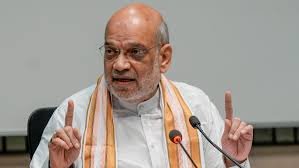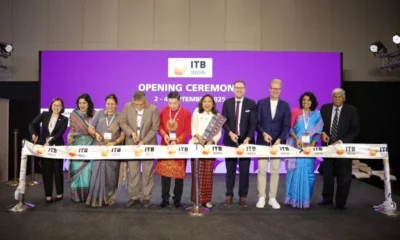Travel Guides & Articles
Skål International India National Congress 2025 in Mumbai sees record turnout and new milestones

The Skål International India National Congress 2025 concluded at the Sahara Star Hotel, Mumbai, after three days of record-breaking participation and landmark announcements. Held from September 12–14, the event brought together more than 200 delegates from across India and overseas, with all participants paying full congress fees — a first in the history of the gathering.
The inaugural evening was marked by glamour and prestige as prominent personalities, including Maneka Gandhi, Shashi Tharoor, Pooja Bedi, Subhash Ghai, and Zayed Khan, graced the occasion. Their presence added star power and gravitas to what became one of the most significant milestones in Skål India’s journey.
Transparency and Vision 2025–2030
The Annual General Meeting (AGM) for FY 2024–25 took place on the opening day, where President Sanjeev Mehra and Treasurer Monik Dharamshi presented detailed reports on finances and activities. Delegates lauded the leadership for its clarity and transparency. The roadmap for Vision 2025–2030 was also unveiled, outlining strategies to expand Skål’s footprint across India, strengthen member engagement, and deepen global linkages.
“This congress was not just about numbers; it was about values, vision, and vitality,” said Dr Mukesh Batra, President, Skål International Mumbai South, the host club. “We were proud to welcome Skålleagues from across India and abroad to celebrate friendship, collaboration, and meaningful business networking.”
Skål International Indian Excellence Awards 2025
A key highlight of the congress was the launch of the Skål International Indian Excellence Awards 2025, introduced by the national board to recognise achievements across 10 categories, including club performance, membership growth, innovation, sustainability, and community impact.
“The Excellence Awards were not merely trophies; they represented the dedication and creativity of Skålleagues driving this movement forward,” said Sanjeev Mehra. “Our vision for the next five years is about collective growth — more clubs, stronger retention, deeper engagement, and a stronger Indian voice on the global stage.”
India Took Global Leadership Role
India’s leadership in the Skål movement was reaffirmed during the congress as the country officially became the largest Skål nation in the world by membership, surpassing the USA. Several Indian clubs also ranked among the global top 10, reflecting India’s dynamic contribution to international tourism networking.
Ambitious plans were announced to establish Skål clubs in every Indian state and Union Territory. A new initiative of “twinning” clubs within India was also introduced to encourage collaboration, mentoring, and shared opportunities.
“India is now firmly at the centre of global Skål activity,” said Shekhar Divadkar, President, Skål International Asia. “The future of Skål lies in Asia, and India is leading the way.”
NSN Mohan, Deputy Vice President and Director Region 10, Skål International, added: “Skål blended business with friendship, creating a unique ecosystem for collaboration and sustainable growth. India’s role will be central to this journey.”
Business, Culture, and Sustainability
The programme featured networking sessions, fireside chats, and celebrations of the 200+ events hosted by Skål clubs nationwide over the past year. Delegates also enjoyed evenings filled with Bollywood-inspired performances, blending culture with camaraderie.
Sustainability was a central theme throughout the event. Organisers implemented environmentally responsible measures, including minimising food and water waste, discouraging single-use plastics, and reducing paper use, in alignment with UNWTO and Skål International’s global ethos.
Looking Ahead
The venue for the Skål International India National Congress 2026 was officially announced during the closing session, generating enthusiasm among delegates. Skål International India also reiterated its ambition to host both the Skål International World Congress and the Skål International Asia Congress in the near future, further positioning the country as a global hub of tourism leadership.
A Landmark Gathering
With record attendance, the launch of the Excellence Awards, strengthened global positioning, and a strong sustainability agenda, the Skål International India National Congress 2025 was hailed as a landmark in the association’s history. More than an annual gathering, it set a new benchmark for Skål events worldwide — a celebration of unity, progress, and vision.
Travel Guides & Articles
Air India Express starts direct flight operations from Doon to Bengaluru, ETTravelWorld

Air India Express on Monday started its direct flight operations from Dehradun to Bengaluru with Chief Minister Pushkar Singh Dhami flagging off the new air service at the Jolly Grant Airport.
The Chief Minister described it as a significant milestone in the overall development of the state and the expansion of air connectivity.
“The commencement of Air India Express services from Dehradun marks a significant achievement in civil aviation for our state. Better connectivity with Bengaluru will greatly boost tourism, trade, and investment opportunities in Uttarakhand,” he said.
Direct air service between Dehradun and Bengaluru by Air India Express would also be a great facility for the youth, entrepreneurs, IT professionals, students, and tourists of Uttarakhand, he said.
“Bengaluru is the tech capital of the country and thousands of youths from Uttarakhand are engaged there in education, services, and startups. Now, they will have a more convenient, timely, and safe travel option to visit their home state,” the Chief Minister said.
“It will also strengthen connectivity for students, professionals, and entrepreneurs with one of India’s most dynamic cities. We welcome Air India Express and look forward to the positive impact this connectivity will have on our people and economy,” Dhami said.
In recent years, the state government has taken several major decisions – from policy reforms to infrastructure development – to strengthen air connectivity, Dhami said.
“We are delighted to commence direct flight operations from Dehradun to our largest domestic hub, Bengaluru. This shows the rapid expansion of our network,” Air India Express MD Aloke Singh said.
“With over 115 aircraft now in our fleet, we are building a stronger and more accessible network that reflects the aspirations of modern India,” he said.
Travel Guides & Articles
Adani Enterprises to construct Kedarnath ropeway project, to cut travel time to 36 minutes

Ahmedabad (Gujarat) [India] September 15 (ANI): Adani Enterprises Ltd (AEL), the flagship company of the Adani Group, on Monday said it has received a Letter of Award (LoA) from the National Highways Logistics Management Ltd (NHLML) to develop the ropeway project between Sonprayag and Kedarnath in Uttarakhand.
It will invest Rs 4,081 crore in the project, to be executed by AEL’s Roads, Metro, Rail and Water (RMRW) division. The 12.9 km ropeway is expected to transform one of India’s most challenging pilgrimages by reducing the journey time from the current 8 to 9-hour trek to just 36 minutes, the company said in a release.
Once completed, the ropeway will be capable of carrying 1,800 passengers per hour per direction, easing the arduous journey for lakhs of devotees visiting the Kedarnath shrine every year. Kedarnath attracts around 20 lakh pilgrims annually, and the new ropeway is projected to not only make the travel safer and faster but also improve the overall pilgrim experience.
The project falls under the Government of India’s National Ropeways Development Programme, ‘Parvatmala and will be developed on a Public-Private Partnership (PPP) mode on a revenue-share basis with NHLML. According to the company, construction is estimated to take six years, after which AEL will operate the ropeway for 29 years.
“The Kedarnath ropeway is more than an engineering project – it is a bridge between devotion and modern infrastructure,” said Gautam Adani, Chairman of the Adani Group, as per the release.
The release further stated, “By making this sacred journey safer, faster and more accessible, we honour the faith of millions while creating new opportunities for Uttarakhand’s people through our partnership with NHLML and the Government of Uttarakhand. This prestigious project reflects our commitment to building infrastructure that not only serves the nation but also uplifts its people.”
Apart from providing improved connectivity, the project is expected to generate direct and indirect employment opportunities and significantly boost tourism in the region.
He further noted that the project reflects Adani Group’s commitment to building infrastructure that not only strengthens the nation but also uplifts communities.
Adani Enterprises, which entered the roads and highways sector in 2018, has steadily expanded its portfolio under the RMRW division. Currently, it has 14 projects across Hybrid Annuity Model (HAM), Build-Operate-Transfer (BOT), and Toll-Operate-Transfer (TOT) modes, covering more than 5,000 lane kilometres.
The Kedarnath ropeway project is being viewed as a landmark step that will combine technological expertise with spiritual significance, providing pilgrims with a safer and more comfortable passage while opening up new economic avenues for the state of Uttarakhand. (ANI)
(This content is sourced from a syndicated feed and is published as received. The Tribune assumes no responsibility or liability for its accuracy, completeness, or content.)
Travel Guides & Articles
From Luxury To Value Travel: How Indian Tourists Are Redefining Holidays | Culture News

Indians are spending big on travel. An survey by Thomas Cook (India) and group company SOTC Travel published earlier this year saw 85% of respondents mentioning their plan to travel more frequently in 2025, doubling or tripling the number of holidays they take. The survey also showed 84% tourists intending to increase their travel budget by 20–50%, with around 18% planning a significant rise. But it’s not just travel, but how they travel that’s also undergoing sea change.
According to industry experts, Indian consumers are spending more on experiences than possessions. The narrative is no longer about luxury versus value – it is about luxury and value, coexisting, colliding, and reshaping the contours of India’s hospitality and aviation economy.
According to experts, India’s luxury hotel market touched an estimated ₹72,000 crore in 2024 and is projected to grow at a brisk 14% CAGR through 2030. At the same time, mid-market and independent accommodations still account for nearly 58% of the hospitality share, supported by a surging middle class and Gen Z road-trippers seeking “value-plus” experiences. “It’s not a binary choice between Oberoi and a budget lodge, it’s coexistence,” observes Sahil Pandita, CEO and Founder, Promiller Group.
Luxury As Lifestyle: Personalisation Beyond Price
Luxury travel is also witnessing a signficant change. The affluent traveller no longer equates luxury to chandeliers and marble lobbies; it is measured in time saved, privacy assured, and experiences tailored to the individual. “Luxury travel today is no longer just about opulence or extravagance; it’s about crafting experiences that are seamless, personal, and entirely tailored to the traveller’s lifestyle,” says Justinas Bulka, CEO of KlasJet. The appetite for curated indulgence, from private aviation with flexible schedules to hotels that anticipate needs before they are expressed, has created a market where “the ultimate indulgence is a journey that respects both comfort and efficiency.”
Increasingly, travellers are refusing to accept a trade-off between indulgence and conscience. Sustainability, once a peripheral demand, has become central to the definition of “premium.” “We are observing that today’s traveller is no longer choosing between luxury and value, they want both in a meaningful way,” says Suprabhath Roy Chowdhury, General Manager, voco Jim Corbett.
Also Read: Travel Bucket List: 10 Incredible Places To Visit In India To Satisfy Your Wanderlust – In Pics
Value Travel: Key Factor Behind India’s Travel Boom
While luxury travel is getting redefined, value travel remains the core of India’s travel industry. According to Pandita, “Middle-class and Gen Z travellers are flying regionally, road-tripping, and choosing unique, independent stays, not just big brands.” In fact, independent hotels continue to dominate share even as chains expand, signalling that travellers still seek discovery, local flavour, and affordability. This is not about compromise; it’s about maximising value in ways that enrich the experience.
-

 Business2 weeks ago
Business2 weeks agoThe Guardian view on Trump and the Fed: independence is no substitute for accountability | Editorial
-
Tools & Platforms1 month ago
Building Trust in Military AI Starts with Opening the Black Box – War on the Rocks
-

 Ethics & Policy2 months ago
Ethics & Policy2 months agoSDAIA Supports Saudi Arabia’s Leadership in Shaping Global AI Ethics, Policy, and Research – وكالة الأنباء السعودية
-

 Events & Conferences4 months ago
Events & Conferences4 months agoJourney to 1000 models: Scaling Instagram’s recommendation system
-

 Jobs & Careers3 months ago
Jobs & Careers3 months agoMumbai-based Perplexity Alternative Has 60k+ Users Without Funding
-

 Podcasts & Talks2 months ago
Podcasts & Talks2 months agoHappy 4th of July! 🎆 Made with Veo 3 in Gemini
-

 Education3 months ago
Education3 months agoVEX Robotics launches AI-powered classroom robotics system
-

 Education2 months ago
Education2 months agoMacron says UK and France have duty to tackle illegal migration ‘with humanity, solidarity and firmness’ – UK politics live | Politics
-

 Podcasts & Talks2 months ago
Podcasts & Talks2 months agoOpenAI 🤝 @teamganassi
-

 Funding & Business3 months ago
Funding & Business3 months agoKayak and Expedia race to build AI travel agents that turn social posts into itineraries



















